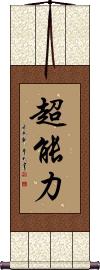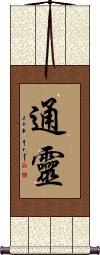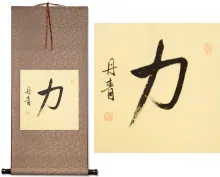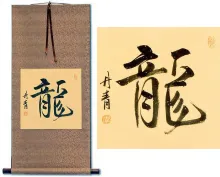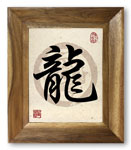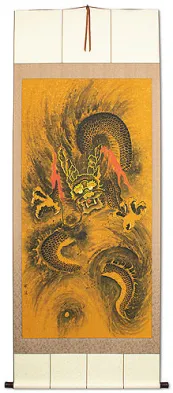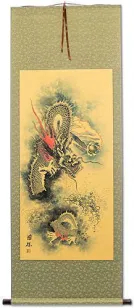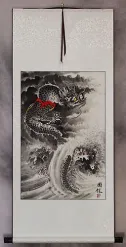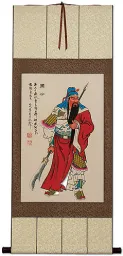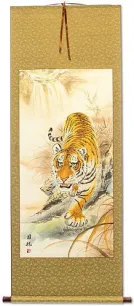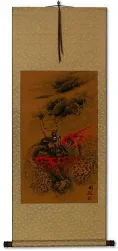Many custom options...
And formats...

Psychic Power in Chinese / Japanese...
Buy a Psychic Power calligraphy wall scroll here!
Personalize your custom “Psychic Power” project by clicking the button next to your favorite “Psychic Power” title below...
Psychic Power
Supernatural Energy
超能力 is a word that is used in both Japanese and Chinese to refer to the ability to comprehend supernatural power.
Some may translate this as psychic ability, psychic power, ESP, or PSI.
Psychic Energy
通靈 is used to speak of something with supernatural essence, psychic power, or magical power in Chinese.
This in-stock artwork might be what you are looking for, and ships right away...
Gallery Price: $67.00
Your Price: $36.88
Gallery Price: $65.00
Your Price: $39.77
Gallery Price: $65.00
Your Price: $39.88
Gallery Price: $65.00
Your Price: $39.88
Gallery Price: $240.00
Your Price: $138.88
Gallery Price: $240.00
Your Price: $148.88
Gallery Price: $240.00
Your Price: $138.88
Gallery Price: $108.00
Your Price: $59.88
Not the results for psychic power that you were looking for?
Below are some entries from our dictionary that may match your psychic power search...
| Characters If shown, 2nd row is Simp. Chinese |
Pronunciation Romanization |
Simple Dictionary Definition |
神 see styles |
shén shen2 shen miwa みわ |
More info & calligraphy: Spirit / Spiritual Essence(1) spirit; psyche; (2) (See 神・かみ・1) god; deity; divinity; kami; (female given name) Miwa Inscrutable spiritual powers, or power; a spirit; a deva, god, or divinity; the human spirit; divine, spiritual, supernatural. |
霊能力 see styles |
reinouryoku / renoryoku れいのうりょく |
More info & calligraphy: Psychic Power |
如意足 see styles |
rú yì zú ru2 yi4 zu2 ju i tsu nyoi soku |
ṛddhipāda, magical psychic power of ubiquity, idem 神足. |
神通變化 神通变化 see styles |
shén tōng biàn huà shen2 tong1 bian4 hua4 shen t`ung pien hua shen tung pien hua jinzū henge |
manifestations of psychic power |
神通變現 神通变现 see styles |
shén tōng biàn xiàn shen2 tong1 bian4 xian4 shen t`ung pien hsien shen tung pien hsien jinzū hengen |
manifestations of psychic power |
妙 see styles |
miào miao4 miao myou / myo みょう |
More info & calligraphy: Clever / Superb / Wonderful(noun or adjectival noun) (1) strange; weird; odd; curious; (noun or adjectival noun) (2) wonder; mystery; miracle; excellence; (noun or adjectival noun) (3) cleverness; adroitness; knack; skill; (surname) Myō su, sat, mañju, sūkṣma. Wonderful, beautiful, mystic, supernatural, profound, subtle, mysterious. su means good, excellent, surpassing, beautiful, fine, easy. sat means existing, real, good. mañju means beautiful, lovely, charming. Intp. in Chinese as 不可思議 beyond thought or discussion; 絕待 special, outstanding; 無比 incomparable; 精微深遠 subtle and profound. |
禪 禅 see styles |
shàn shan4 shan yuzuri ゆずり |
More info & calligraphy: Zen / Chan / Meditation(out-dated kanji) (1) (Buddhist term) dhyana (profound meditation); (2) (abbreviation) Zen (Buddhism); (surname) Yuzuri To level a place for an altar, to sacrifice to the hills and fountains; to abdicate. Adopted by Buddhists for dhyāna, 禪 or 禪那, i.e. meditation, abstraction, trance. dhyāna is 'meditation, thought, reflection, especially profound and abstract religious contemplation'. M.W. It was intp. as 'getting rid of evil', etc., later as 靜慮 quiet meditation. It is a form of 定, but that word is more closely allied with samādhi, cf. 禪定. The term also connotes Buddhism and Buddhist things in general, but has special application to the 禪宗 q.v. It is one of the six pāramitās, cf. 波. There are numerous methods and subjects of meditation. The eighteen brahmalokas are divided into four dhyāna regions 'corresponding to certain frames of mind where individuals might be reborn in strict accordance with their spiritual state'. The first three are the first dhyāna, the second three the second dhyāna, the third three the third dhyāna, and the remaining nine the fourth dhyāna. See Eitel. According to Childers' Pali Dictionary, 'The four jhānas are four stages of mystic meditation, whereby the believer's mind is purged from all earthly emotions, and detached as it were from his body, which remains plunged in a profound trance.' Seated cross-legged, the practiser 'concentrates his mind upon a single thought. Gradually his soul becomes filled with a supernatural ecstasy and serenity', his mind still reasoning: this is the first jhāna. Concentrating his mind on the same subject, he frees it from reasoning, the ecstasy and serenity remaining, which is the second jhāna. Then he divests himself of ecstasy, reaching the third stage of serenity. Lastly, in the fourth stage the mind becomes indifferent to all emotions, being exalted above them and purified. There are differences in the Mahāyāna methods, but similarity of aim. |
悟空 see styles |
wù kōng wu4 kong1 wu k`ung wu kung gokuu / goku ごくう |
More info & calligraphy: Wukong / Goku(surname, given name) Gokuu |
猴王 see styles |
hóu wáng hou2 wang2 hou wang |
More info & calligraphy: Monkey King |
白狐 see styles |
bái hú bai2 hu2 pai hu byakko びゃっこ |
More info & calligraphy: Arctic Fox(1) old, white fox (trad. said to have supernatural powers); (2) (See ホッキョクギツネ) Arctic fox (Vulpes lagopus); (place-name) Byakko |
孫悟空 孙悟空 see styles |
sūn wù kōng sun1 wu4 kong1 sun wu k`ung sun wu kung songokuu / songoku そんごくう |
More info & calligraphy: Sun Wukong / Son Goku(1) (char) Sun Wukong (character in the classic Chinese novel Journey to the West); Monkey King; (2) (char) Son Goku (Dragon Ball); (ch) Sun Wukong (character in the classic Chinese novel Journey to the West); Monkey King; (ch) Son Goku (Dragon Ball) |
超能力 see styles |
chāo néng lì chao1 neng2 li4 ch`ao neng li chao neng li chounouryoku / chonoryoku ちょうのうりょく |
More info & calligraphy: Supernatural Energy(1) extra-sensory perception; ESP; psi; psychic ability; (2) psychokinesis; PK |
凡 see styles |
fán fan2 fan bon ぼん |
ordinary; commonplace; mundane; temporal; of the material world (as opposed to supernatural or immortal levels); every; all; whatever; altogether; gist; outline; note of Chinese musical scale (noun or adjectival noun) (rare) (See 平凡) (ant: 非凡) ordinary; common; mediocre; (given name) Bon All, everybody, common, ordinary. |
通 see styles |
tòng tong4 t`ung tung michiaki みちあき |
classifier for an activity, taken in its entirety (tirade of abuse, stint of music playing, bout of drinking etc) (n,n-suf,adj-na) (1) authority; expert; connoisseur; well-informed person; (counter) (2) counter for messages, letters, notes, documents, etc.; (noun or adjectival noun) (3) understanding (esp. of male-female relations); tact; insight; (4) supernatural powers; magical powers; (given name) Michiaki Permeate, pass through, pervade; perceive, know thoroughly; communicate; current; free, without hindrance, unimpeded universal; e.g. 神通 supernatural, ubiquitous powers. There are categories of 五通, 六通, and 十通, all referring to supernatural powers; the five are (1) knowledge of the supernatural world; (2) deva vision; (3) deva hearing; (4) knowledge of the minds of all others; (5) knowledge of all the transmigrations of self and all others. The six are the above together with perfect wisdom for ending moral hindrance and delusion. The ten are knowing all previous transmigrations, having deva hearing, knowing the minds of others, having deva vision, showing deva powers, manifesting many bodies or forms, being anywhere instantly, power of bringing glory to one's domain, manifesting a body of transformation, and power to end evil and transmigration. |
魔 see styles |
mó mo2 mo ma ま |
(bound form) evil spirit; devil; (prefix) supernatural; magical (1) demon; devil; evil spirit; evil influence; (suffix noun) (2) (See 覗き魔) -crazed person; -obsessed person; fiend; (can be adjective with の) (3) dreaded; terrible; awful; dreadful; (surname) Ma 魔羅 Māra, killing, destroying; 'the Destroyer, Evil One, Devil' (M.W.); explained by murderer, hinderer, disturber, destroyer; he is a deva 'often represented with a hundred arms and riding on an elephant'. Eitel. He sends his daughters, or assumes monstrous forms, or inspires wicked men, to seduce or frighten the saints. He 'resides with legions of subordinates in the heaven Paranirmita Vaśavartin situated on the top of the Kāmadhātu'. Eitel. Earlier form 磨; also v. 波 Pāpīyān. He is also called 他化自在天. There are various categories of māras, e.g. the skandha-māra, passion-māra, etc. |
三明 see styles |
sān míng san1 ming2 san ming mitsuaki みつあき |
see 三明市[San1 ming2 Shi4] {Buddh} (See 宿命通,天眼通,漏尽通) three kinds of awareness; (surname, given name) Mitsuaki The three insights; also 三達. Applied to Buddhas they are called 三達, to arhats 三明. (a) 宿命明 Insight into the mortal conditions of self and others in previous lives; (b) 天眼明 supernatural insight into future mortal conditions; (c) 漏盡明 nirvāṇa insight, i.e. into present mortal sufferings so as to overcome aIl passions or temptations. In the 倶舍論 27 the three are termed 住智識證明; 死生識證明 and 漏盡識證明. For 三明經 v. 長阿含16. |
三輪 三轮 see styles |
sān lún san1 lun2 san lun miwa みわ |
three wheels; (p,s,f) Miwa The three wheels: (1) The Buddha's (a) 身 body or deeds; (b) 口 mouth, or discourse; (c) 意 mind or ideas. (2) (a) 神通 (or 變) His supernatural powers, or powers of (bodily) self-transformation, associated with 身 body; (b) 記心輪 his discriminating understanding of others, associated with 意 mind; (c) 敎誡輪 or 正敎輪 his (oral) powers of teaching, associated with 口. (3) Similarly (a) 神足輪 ; (b) 說法輪 ; (c) 憶念輪 . (4) 惑, 業, and 苦. The wheel of illusion produces karma, that of karma sets rolling that of suffering, which in turn sets rolling the wheel of illusion. (5) (a) Impermanence; (b) uncleanness; (c) suffering. Cf. 三道. |
二光 see styles |
èr guāng er4 guang1 erh kuang nikō |
The dual lights, i.e. 色光 the halo from a Buddha's body and 心光 the light from his mind. Also 常光 the constant halo from the bodies of Buddhas and 神通光 the supernatural light sent out by a Buddha (e.g. from between his eyebrows) to illuminate a distant world. |
五力 see styles |
wǔ lì wu3 li4 wu li goriki |
pañcabalāni, the five powers or faculties — one of the categories of the thirty-seven bodhipakṣika dharma 三十七助道品; they destroy the 五障 five obstacles, each by each, and are: 信力 śraddhābala, faith (destroying doubt); 精進力 vīryabala, zeal (destroying remissness); 念 or 勤念 smṛtibala, memory or thought (destroying falsity); 正定力 samādhibala, concentration of mind, or meditation (destroying confused or wandering thoughts); and 慧力 prajñābala, wisdom (destroying all illusion and delusion). Also the five transcendent powers, i. e. 定力 the power of meditation; 通力 the resulting supernatural powers; 借識力 adaptability, or powers of 'borrowing' or evolving any required organ of sense, or knowledge, i. e. by beings above the second dhyāna heavens; 大願力 the power of accomplishing a vow by a Buddha or bodhisattva; and 法威德力 the august power of Dharma. Also, the five kinds of Mara powers exerted on sight, 五大明王. |
五旬 see styles |
wǔ xún wu3 xun2 wu hsün gojun |
pañca-bhijñā. The five supernatural or magical powers; six is the more common number in Chinese texts, five is the number in Ceylon; v. 五神通. |
五通 see styles |
wǔ tōng wu3 tong1 wu t`ung wu tung gotsuu / gotsu ごつう |
bottom bracket shell (in a bicycle frame); (Buddhism) the five supernatural powers (abbr. for 五神通[wu3 shen2 tong1]) (surname) Gotsuu v. 五神通. |
人魂 see styles |
hitodama ひとだま |
disembodied soul; supernatural fiery ball |
八部 see styles |
bā bù ba1 bu4 pa pu yabe やべ |
(abbreviation) {Buddh} (See 八部衆) the eight legions (devas, nagas, yaksas, gandharvas, asuras, garudas, kimnaras, mahoragas); (surname) Yabe (八部衆) The eight classes of supernatural beings in the Lotus sūtra: 天 deva, 龍 nāga, 夜叉yakṣa, 乾闥婆 gandharva, 阿修羅 asura, 迦樓羅 garuḍa, 緊那羅 kinnara, 摩喉羅迦 mahoraga. Also called 天龍八部 and 龍神八部. |
六通 see styles |
liù tōng liu4 tong1 liu t`ung liu tung rokutsū |
abhijñā, or ṣaḍ abhijñā. The six supernatural or universal powers acquired by a Buddha, also by an arhat through the fourth degree of dhyāna. The 'southern' Buddhists only have the first five, which are also known in China; v. 五神通; the sixth is 漏盡通 (漏盡智證通) āsravakṣaya-jñāna, supernatural consciousness of the waning of vicious propensities. |
冥通 see styles |
míng tōng ming2 tong1 ming t`ung ming tung myōtsū |
Mysterious, supernatural, omnipresent power. |
分身 see styles |
fēn shēn fen1 shen1 fen shen bunshin(p); funjin(ok) ぶんしん(P); ふんじん(ok) |
(of one who has supernatural powers) to replicate oneself so as to appear in two or more places at the same time; a derivative version of sb (or something) (e.g. avatar, proxy, clone, sockpuppet); to spare some time for a separate task; to cut a corpse into pieces; to pull a body apart by the four limbs; parturition (1) other self; alter ego; part of oneself (in someone or something else); representation of oneself; (2) {Buddh} incarnations of Buddha Parturition: in Buddhism it means a Buddha's power to reproduce himself ad infinitum and anywhere. |
十地 see styles |
shí dì shi2 di4 shih ti juuji / juji じゅうじ |
{Buddh} dasabhumi (forty-first to fiftieth stages in the development of a bodhisattva); (place-name) Jūji daśabhūmi; v. 十住. The "ten stages" in the fifty-two sections of the development of a bodhisattva into a Buddha. After completing the十四向 he proceeds to the 十地. There are several groups. I. The ten stages common to the Three Vehicles 三乘 are: (1) 乾慧地 dry wisdom stage, i. e. unfertilized by Buddha-truth, worldly wisdom; (2) 性地 the embryo-stage of the nature of Buddha-truth, the 四善根; (3) 八人地 (八忍地), the stage of the eight patient endurances; (4) 見地 of freedom from wrong views; (5) 薄地 of freedom from the first six of the nine delusions in practice; (6) 離欲地 of freedom from the remaining three; (7) 巳辨地 complete discrimination in regard to wrong views and thoughts, the stage of an arhat; (8) 辟支佛地 pratyeka-buddhahood, only the dead ashes of the past left to sift; (9) 菩薩地 bodhisattvahood; (10) 佛地 Buddhahood. v. 智度論 78. II. 大乘菩薩十地 The ten stages of Mahāyāna bodhisattva development are: (1) 歡喜地 Pramuditā, joy at having overcome the former difficulties and now entering on the path to Buddhahood; (2) 離垢地 Vimalā, freedom from all possible defilement, the stage of purity; (3) 發光地 Prabhākarī, stage of further enlightenment; (4) 焰慧地 Arciṣmatī, of glowing wisdom; (5) 極難勝地 Sudurjayā, mastery of utmost or final difficulties; (6) 現前地 Abhimukhī, the open way of wisdom above definitions of impurity and purity; (7) 遠行地 Dūraṁgamā, proceeding afar, getting above ideas of self in order to save others; (8) 不動地 Acalā, attainment of calm unperturbedness; (9) 善慧地 Sādhumatī, of the finest discriminatory wisdom, knowing where and how to save, and possessed of the 十力 ten powers; (10) 法雲地 Dharmamegha, attaining to the fertilizing powers of the law-cloud. Each of the ten stages is connected with each of the ten pāramitās, v. 波. Each of the 四乘 or four vehicles has a division of ten. III. The 聲聞乘十地 ten Śrāvaka stages are: (1) 受三歸地 initiation as a disciple by receiving the three refuges, in the Buddha, Dharma, and Saṅgha; (2) 信地 belief, or the faith-root; (3) 信法地 belief in the four truths; (4) 内凡夫地 ordinary disciples who observe the 五停心觀, etc.; (5) 學信戒 those who pursue the 三學 three studies; (6) 八人忍地 the stage of 見道 seeing the true Way; (7) 須陀洹地 śrota-āpanna, now definitely in the stream and assured of nirvāṇa; (8) 斯陀含地 sakrdāgāmin, only one more rebirth; (9) 阿那含地 anāgāmin, no rebirth; and (10) 阿羅漢地 arhatship. IV. The ten stages of the pratyekabuddha 緣覺乘十地 are (1) perfect asceticism; (2) mastery of the twelve links of causation; (3) of the four noble truths; (4) of the deeper knowledge; (5) of the eightfold noble path; (6) of the three realms 三法界; (7) of the nirvāṇa state; (8) of the six supernatural powers; (9) arrival at the intuitive stage; (10) mastery of the remaining influence of former habits. V. 佛乘十地 The ten stages, or characteristics of a Buddha, are those of the sovereign or perfect attainment of wisdom, exposition, discrimination, māra-subjugation, suppression of evil, the six transcendent faculties, manifestation of all bodhisattva enlightenment, powers of prediction, of adaptability, of powers to reveal the bodhisattva Truth. VI. The Shingon has its own elaborate ten stages, and also a group 十地十心, see 十心; and there are other groups. |
十妙 see styles |
shí miào shi2 miao4 shih miao jūmyō |
The ten wonders, or incomprehensibles; there are two groups, the 迹v traceable or manifested and 本門妙 the fundamental. The 迹門十妙 are the wonder of: (1) 境妙 the universe, sphere, or whole, embracing mind, Buddha, and all things as a unity; (2) 智妙 a Buddha's all-embracing knowledge arising from such universe; (3) 行妙 his deeds, expressive of his wisdom; (4) 位妙 his attainment of all the various Buddha stages, i.e. 十住 and十地; (5) 三法妙 his three laws of 理, 慧, and truth, wisdom, and vision; (6) 感應妙 his response to appeal, i.e. his (spiritual) response or relation to humanity, for "all beings are my children"; (7) 神通妙 his supernatural powers; (8) 說法妙 his preaching; (9) 眷屬妙 his supernatural retinue; (10) 利益妙 the blessings derived through universal elevation into Buddhahood. The 本門十妙 are the wonder of (1) 本因妙 the initial impulse or causative stage of Buddhahood; (2) 本果妙 its fruit or result in eternity, joy, and purity; (3) 國土妙 his (Buddha) realm; (4) 感應妙 his response (to human needs); (5) 神通妙 his supernatural powers; (6) 說法妙 his preaching; (7) 眷屬妙 his supernatural retinue; (8) 涅槃妙 his nirvāṇa; (9) 壽命妙 his (eternal) life; (10) his blessings as above. Both groups are further defined as progressive stages in a Buddha's career. These "wonders" are derived from the Lotus sūtra. |
十通 see styles |
shí tōng shi2 tong1 shih t`ung shih tung totoori ととおり |
(place-name) Totoori Ten supernatural powers, e.g. of seeing, hearing, appearance, etc.; cf. 五神通. |
呪物 see styles |
jubutsu じゅぶつ |
fetish (object believed to have supernatural powers) |
Click here for more psychic power results from our dictionary
The following table may be helpful for those studying Chinese or Japanese...
| Title | Characters | Romaji (Romanized Japanese) | Various forms of Romanized Chinese | |
| Psychic Power | 霊能力 | reinouryoku reinoryoku | ||
| Supernatural Energy | 超能力 | chounouryoku chonoryoku | chāo néng lì chao1 neng2 li4 chao neng li chaonengli | ch`ao neng li chaonengli chao neng li |
| Psychic Energy | 通靈 通灵 | tōng líng tong1 ling2 tong ling tongling | t`ung ling tungling tung ling |
|
| In some entries above you will see that characters have different versions above and below a line. In these cases, the characters above the line are Traditional Chinese, while the ones below are Simplified Chinese. | ||||
Successful Chinese Character and Japanese Kanji calligraphy searches within the last few hours...

